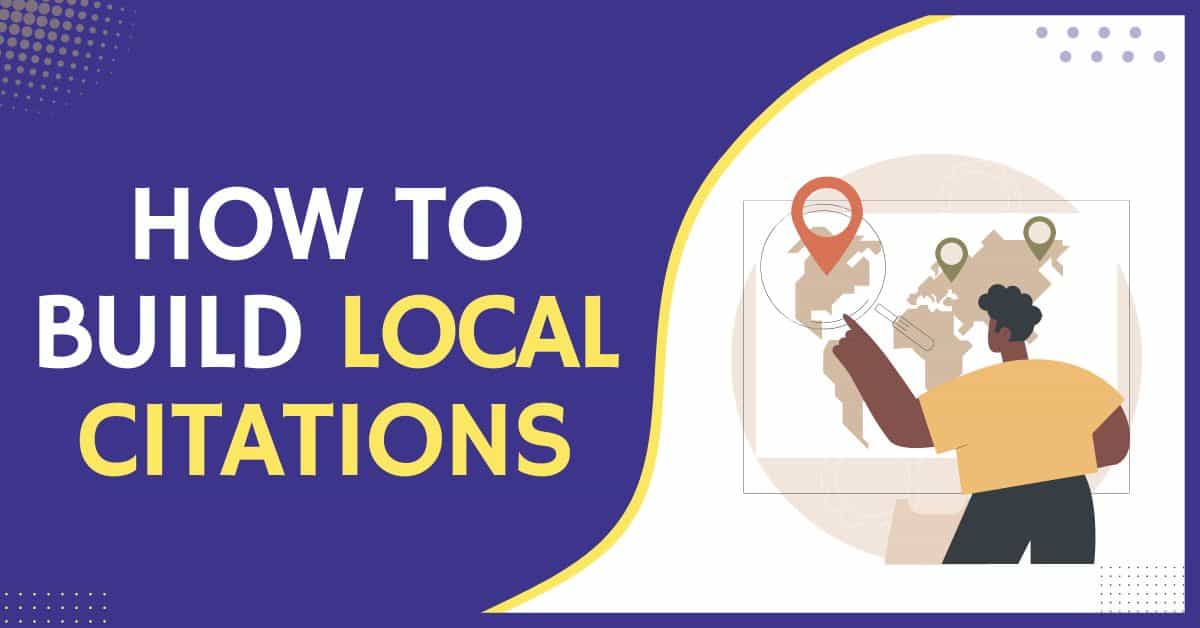Last Updated on 3 weeks by Rabin Rasaili
As a local business owner, being visible in local search results is crucial for attracting nearby customers. One of the critical factors that influence your local search rankings is local citations.
But what exactly are local citations, and why do they matter? Most importantly how to build local citations?
This comprehensive guide will walk you through everything you need to know about building and maintaining local citations, helping you boost your local SEO and attract more customers.
Let’s get started!
What are Local Citations?
Local citations are any mention of your business’s name, address, and phone number (NAP) online. These mentions can be on business directories, websites, social media platforms, and more.
Local citations can be categorized into two types:
- Structured Citations: These appear in a structured format, such as online business directories (e.g., Yelp, Yellow Pages).
- Unstructured Citations: These appear in non-directory websites, such as blogs, news sites, or social media posts.
Why are Local Citations Important?
Citations are one of the critical ranking factors when it comes to Local SEO. Search engines use local citations to verify that your business information is accurate and legitimate.
When your NAP is consistent across many trusted sources, it tells search engines they can trust your business, helping your business rank higher in local search results.
In addition to boosting local search visibility, local citations also:
- Improve your business’s online credibility and trustworthiness
- Make it easier for potential customers to find and contact you.
- Help you outrank competitors with incomplete or inconsistent local citations
- Increase the chances of your business appearing in the local pack/map pack
How to Build Local Citations
1. Conducting a Local Citation Audit
The first step in building local citations is identifying your existing online mentions. This allows you to correct any inaccurate information and identify citation opportunities.
Use a Local Citation Audit Tool
There are various tools (e.g., Brightlocal, Moz Local, Whitespark) that scan the web for your business listings and provide a report on your existing citations, their accuracy, and potential new citation sources.
Manual Search
You can also conduct a manual search by Googling your business name, address, and relevant keywords to uncover existing citations across directories, review sites, social media, and other online listings.
2. Creating a Local Citation Building Strategy
Once you have a clear picture of your current local citations, it’s time to develop a strategic plan for acquiring new, high-quality citations.
Claim and Optimize Data Aggregator Listings
Data aggregators like Neustar Localeze, Factual, and Acxiom are powerful sources that feed business listing data to numerous online directories and apps. Claiming and accurately listing your business information with these aggregators can significantly boost the consistency of your citations across the web.
Identify Relevant, High-Authority Citation Sources
Focus on getting citations from authoritative, industry-relevant, and locally-focused sources. Some examples include:
- Top general directories (Yelp, Yellow Pages, Foursquare)
- Leading industry-specific directories (Avvo for lawyers, HomeAdvisor for home services)
- Local directories (community websites, local business associations, local blogs)
- Data aggregators (as mentioned above)
Prioritize Citation Sources
Tackle the most impactful citation sources first. Generally, you’ll want to start with the major data aggregators, followed by high-authority general directories, and then industry-specific and local directories.
Ensure NAP Consistency
When building new citations, ensure that your business name, address, and phone number are consistent across all listings. Even slight variations can confuse search engines and diminish the value of your citations.
Include Complete Business Information
In addition to your core NAP details, provide complete information about your business, such as:
- Website URL
- Business categories/subcategories
- Operating hours
- Payment options
- Logos and photos
- Product/service descriptions
3. Building New Local Citations
With your strategy in place, it’s time to start acquiring new local citations actively. There are a few ways to go about this:
Manual Submission
Visit each relevant directory or listing site individually and manually submit your business information through their “add a listing” or similar form. This approach is time-consuming but allows you to have complete control over the accuracy of your listings.
Use a Citation Building Service
There are many third-party services (e.g., Bright Local, Moz Local, Yext) that can help you build new citations across a vast network of directories and data sources with a single submission. While convenient, these services often come at a recurring cost.
Combining Approaches
For most local businesses, a combined approach works best – manually submitting to the most important/relevant citation sources, and then using a service to acquire remaining citations efficiently.
No matter which route you choose, be sure to:
- Double-check your NAP and business details before submitting
- Upload high-quality business logos, photos, descriptions, etc.
- Select all relevant business categories
- Keep submission details consistent across platforms
4. The Role of Structured Data
Implementing structured data markup on your website can also give your local citations an extra boost. Structured data (schema.org markup) helps search engines better understand and display your NAP and other business information in search results.
For local businesses, focus on implementing:
- Local Business markup
- Organization markup
- NAP markup (address, telephone, opening hours)
There are various structured data generators and markup tools that can help you properly implement local business schema.
5. Building Citations on Niche and Local Websites
Look for opportunities to get citations on websites specific to your industry or local area. Industry-specific directories, local business associations, and community websites can be great sources.
When reaching out to these sites, explain how getting a citation listing can benefit both your business and their website.
6. Collaborating with Local Influencers and Partners
Partner up with local influencers and other businesses to gain more visibility and citations. It could include writing guest blog posts for each other, hosting joint events, or giving shoutouts on social media.
Partnering with others in your local area can really help improve your local SEO and bring in more customers.
7. Managing and Maintaining Citations
Building local citations is an ongoing process, not a one-time effort. You’ll need to monitor and maintain your online listings continually.
Set Up Alerts and Reports: Use a tool or set up Google Alerts to monitor when your business is mentioned or listed on new online sources. This allows you to verify accuracy quickly.
Handle Business Changes: If your company undergoes any changes (address change, rebranding, new phone number, etc.), be sure to update your information across all existing local citations systematically.
Respond to Reviews: While not directly citations, responding to customer reviews on your listings shows search engines you actively manage your online presence.
Remove Duplicate/Inaccurate Listings: If you find duplicate or incorrect citations, submit requests to have them updated or removed through the site’s owner verification system.
Regularly Updating Your Business Information: It’s essential to keep your business information up-to-date. Changes in address, phone number, or business hours should be promptly reflected across all citations.
Local Citation Building Best Practices
Some key local citation-building best practices:
- Ensure NAP consistency across all listings
- Focus on quality over quantity – prioritize authoritative, relevant sources
- Build citations naturally over time, not all at once
- Monitor citations regularly and update information as needed
- Be patient – it takes time to see the full impact on local rankings
- Combine manual submission with third-party services
- Leverage data aggregators to efficiently disseminate your core citations
- Implement structured data markup on your website
Conclusion
In conclusion, learning how to build local citations is crucial for any local business owner looking to improve their visibility in local search results. Local citations act as digital trust signals, helping search engines verify your business information and boosting your local rankings.
While building an extensive network of accurate local citations requires patience and perseverance, the payoff of ranking higher in local search and attracting more local customers makes it well worth the effort.
Implement the tips and best practices outlined here, and you’ll be on your way to dominating local SEO through a strong local citation profile.
Good luck!

Rabin is an enthusiastic SEO and a content creator who is also a BCA graduate. He shares easy-to-follow hacks and tips to help you make smart choices for SEO tools and strategies through his blog. Passionate about learning and sharing, Rabin’s goal is to help you navigate your SEO and blogging journey with confidence.
